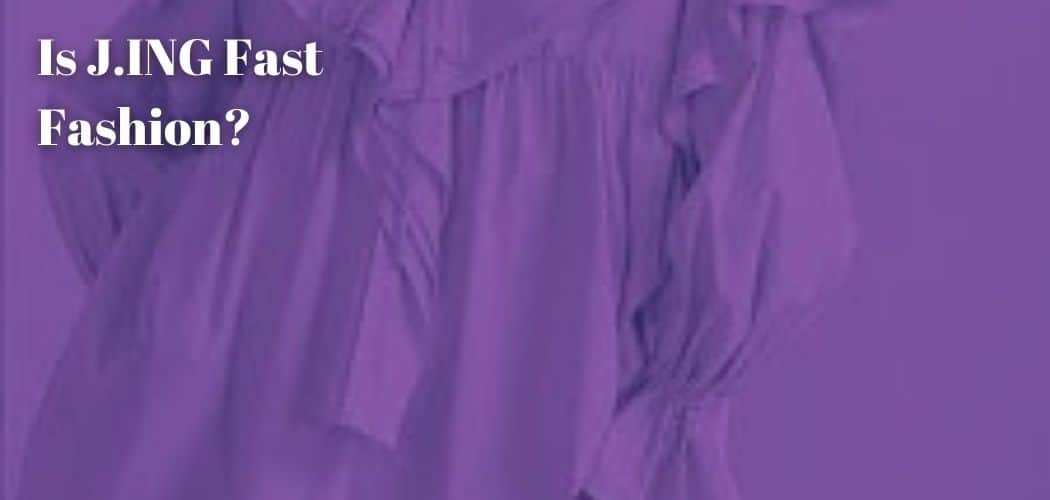Yes, J.ING is a fast-fashion brand! They produce clothes in bulk and new products are released almost every other week.
Keep reading to understand different reasons why Jing qualifies as a fast-fashion brand.
Whenever you’re buying something, many different questions pop to mind. Before making a purchase, one must find answers to these questions to be able to make an informed decision.
As the brand, J.ING, rises in popularity day by day, one of the common questions customers have is if its fast-fashion or not.
People are constantly trying to change their shopping habits and are trying to adopt more environmentally cautious ones. Therefore, it is the right to know what big brands are up to.
For that reason, I’m here to help you out! In this article, I’ll be focusing on the fashion brand, J.ING, and discussing its status related to fast fashion.
So let’s get right to it!
Is J.ING actually fast fashion?
J.ING is a fast fashion company as it releases new products every 2 to 3 weeks. It tends to offer trendy designs in cheap prices and has production happening in China.
It also uses synthetic fabrics in most of its apparel.
Fast fashion is basically when a certain business strategy is adapted by many fashion brands. The strategy is that brands replicate latest fashion trends and designs.
Then it produces these trends at a mass scale to exploit economies.

As its name suggests, every feature of a fast fashion brand is fast. The products are designed, produced, and stored in retail stores all within a time span of a few weeks.
The consumer that buys this product has to dispose of it right after using it a few times as it’s no longer the latest trend.
This is not so much of a problem for brands. In fact, it allows them to increase their sales and gain more revenue.
On the other hand, this strategy is a huge problem for our environment as it’s negatively impacting it. Later on in the article, we’ll discuss why fast fashion is concerning.
For now, let’s take a look at the reasons why J.ING qualifies as a fast-fashion brand. A significant part of fast fashion is its low prices.
This attracts customers as the latest designs are available to them at very affordable rates.
Jing openly admits that its aim is to produce couture fashion for women at affordable rates. This goes on to show that price rates are an important feature of its offerings.
Such fashion brands prefer the use of synthetic fabrics because their cost is cheap and can make higher profits the natural fabrics. Such fabrics are made in labs, which is why they’re cheaper than most natural fabrics.
Some other fabrics commonly used by Jing are Spandex and polyester. These are the leading polluters of the ecosystem.

Moreover, the brand regularly releases new products. This is a central aspect of fast fashion. A new product line comes out every 2 to 3 weeks.
Jing doesn’t even restock its designs and this indicates how the company is fast fashioned.
Most fast fashion brands tend to outsource the manufacturing of their products to countries with lower production costs.
This helps them keep their costs low and still maintain good profits. Jing’s products are manufactured in China, which is a low-priced country.
All of the above reasons clearly point to the fact that J.ING is a fast-fashion company. This is causing a lot of problems for the world.
Is J.ING sustainable?
Fast fashion brands can’t be considered as sustainable ones. This is because fast fashion products aren’t meant to be durable and quickly wear down after a short period.
They end up in piles in landfills causing pollution to the environment. The production of fast fashion products leads to hundreds of tons of microfibers being released in the ocean.
Water supplies are getting polluted by wastewater discharged by these factories producing fast fashion products. This is harming the environment.
There are many other factors that determine whether a fashion brand is sustainable or not. Jing isn’t fully sustainable! The company doesn’t even have any recycling programs in place.

Additionally, they haven’t provided any details on measures taken to ensure that the company implements sustainable practices.
This indicates that the company doesn’t have a practical or sustainable approach.
In today’s world, it is expected of companies to clearly explain the precautions they put in place to ensure that they are operating ethically.
For a brand like J.ING, you’d hope to find a website that specifies these policies.
Unfortunately, J.ING has provided no explanation on how it upholds its ethical values. It only claims that it provides guilt free fashion which is sustainable as well.
Additionally, the workers at such a garment factory are paid meager wages and also work in unsafe conditions. This is highly unethical.
Therefore, after evaluation and a lot of reviews of this company, a conclusion reached is that Jing isn’t sustainable nor is it ethical.
Who is J.ING owned by?
J.ING Limited Inc. is an American-based brand that was established in 2017 by Jing Zeng. It’s a primarily Asian-owned company with its head offices located in Los Angeles, California.

Due to her own love for high fashion, Zeng successfully curated the brand J.ING for other women like her.
Her main aim was the price point. She wants every woman to be able to dress well without having to pay a hefty cost.
The brand focuses on women’s fashion and products which includes clothing, accessories, shoes, as well as yoga wear. Products sold by Jing are well designed, high-quality, and cost-effective.
Conclusion
While fast fashion can be good for people who want to buy clothes at a cheaper rate, it also has many cons for the environment. Many people happily purchase products from fast fashion brands.
Contrastingly, others will only buy from it if they’re convinced that this brand is ethical and sustainable.
Although, J.ING being fast fashion shouldn’t be the only reason why people should avoid it. After all, they do have women’s interests at heart.
Therefore, the decision of purchasing from this brand comes down to one’s own personal values.
